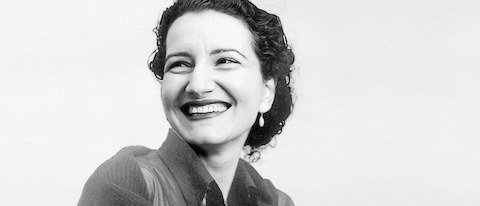Ayse Birsel was born in Turkey, a land of contrasts. Birsel and her designs are combinations of contrasting points of view. Like her homeland, where thoroughly modern ideas and practices exist side-by-side with centuries-old structures and customs, Birsel’s designs make everything work. Born in the port city of Izmir, the Turkish name for Smyrna, a town more than 2,000 years old, Birsel absorbed a Mediterranean cosmopolitanism.
She studied industrial design at Middle Eastern Technical University in Ankara, the capital of Turkey, from 1981 to 1985. A Fulbright scholarship brought her to the Pratt Institute in New York for work on her Masters [Master’s] degree. At Pratt, Ayse especially remembers Bruce Hannah, Rowena Reed, and Peter Barna, from whom she learned a “no-nonsense” view of design—as Ayse says, a way of “distilling problems, solutions, and forms to their essence.” This became her design perspective—distilling problems to reveal novel answers.
With charming bluntness, Ayse tells people that “being an outsider” is a big help.
“Because I’m curious of so many things, I find it easy to collaborate with people who can teach me,” she says. Her openness to new ideas comes in handy in the world of design. She thinks designers benefit from being apart, from being able to observe from the outside without prejudice.
Such a perspective leads her to enjoy working with organizations that embrace change. “I’m not very good at giving new form to old answers.” Design for Ayse is a selfish process. She designs because she likes to. Though innovation is often the result of her work, it is never the goal. “Too much emphasis on innovation produces too much junk,” she says. So Ayse is always asking “Why?” and “Why not?” Collaboration leads to synthesis.
Her thesis at Pratt, “The Water Room,” won an ID Award for Concepts and the Design of the Future competition in Japan. She then designed a collection of office accessories with Bruce Hannah. In 1995, she designed a combination bidet and toilet for Japanese manufacturer Toto. In June 1997, she began work on the Resolve office system. Later, Birsel’s design with husband Bibi Seck—Teneo Storage Furniture—achieved widespread acclaim. Her next collaboration with Seck for Herman Miller, Overlay, is a system of freestanding, movable walls designed to transform the open office.
Birsel is also the creator of Design the Life You Love—a book, online course, in-person workshop, and podcast—that teaches non-designers how to create a meaningful life. “Our lives are our biggest design projects,” she says. “What fascinates me is to solve problems and try to make people’s lives better, whether it’s through products or simply through the process of design.”
